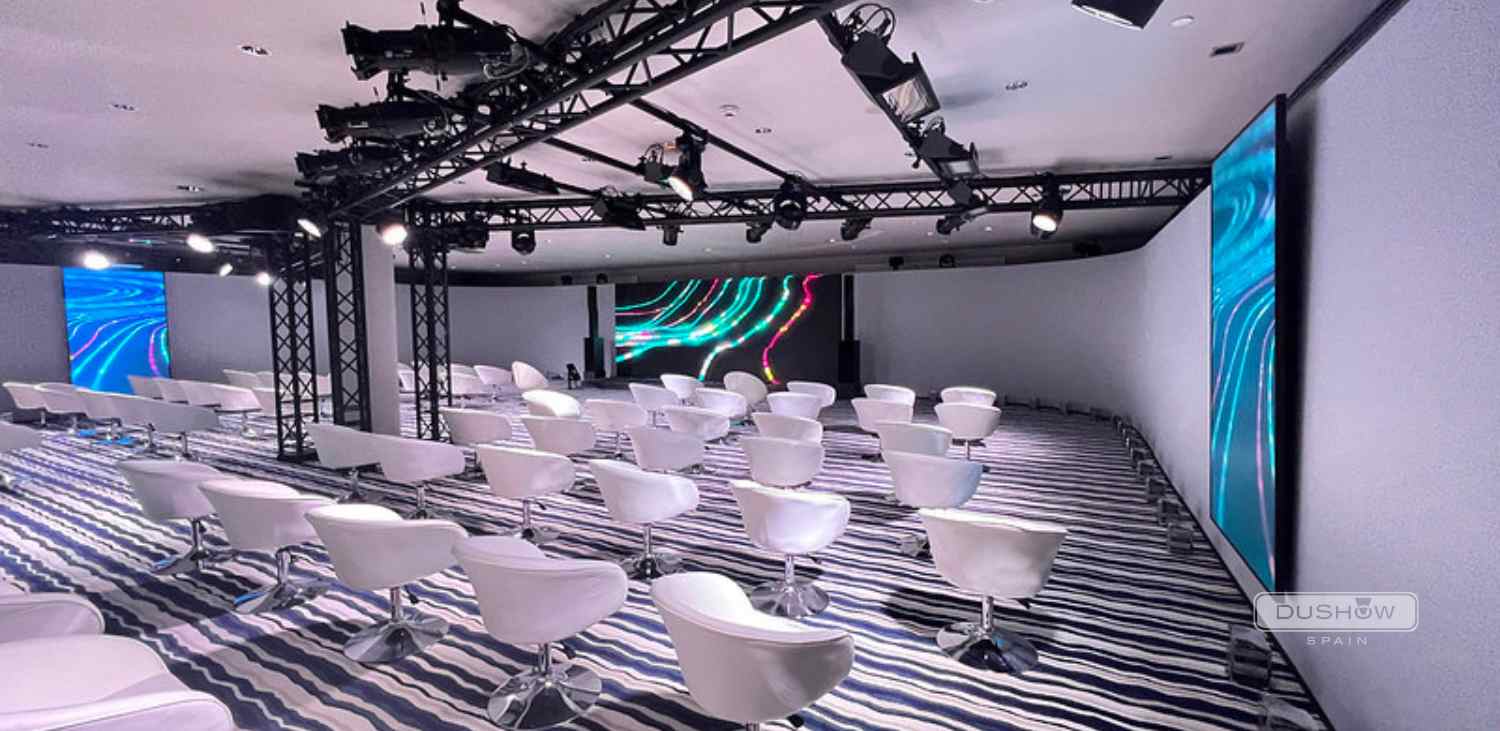Dushow Spain is now Novelty Spain
7 professional event planning terms you should know
In recent years, the event production world has evolved significantly, and consolidated along the way a long list of event planning terms, acronyms and technical vocabulary that industry professionals use in their day-to-day work.
Making key decisions without knowing this lexicon can be overwhelming. So in this article, we will reveal seven essential event planning terms you should know when organizing an event with your AV Partner. Let’s get started!
1. Cue to cue
The final stage of event pre-production is usually to hold a dress rehearsal to ensure that everything goes according to plan. During this rehearsal, technical run-throughs are also carried out in which the proper operation of all technical and audiovisual equipment is confirmed to minimize any risk of defective operation during the event, and by doing so, offer your audience the best possible experience. This is one of the event planning terms that is used to ensure everything fits perfectly.
It is worth mentioning that there are no breaks, remarks or changes during a dress rehearsal. It’s about running through everything in the same order that will be followed on the day of the event.
Whether the event you’re organizing is for 50 people, or you are thinking of a conference with over 5,000 attendees, a rehearsal before the event is essential, and will always improve the final result of your event in general, bringing a higher level of professionalism and reliability to the brand.
2. Health and Safety
Within event planning terms there is "Health and Safety". It stands for all of the activities or measures taken or planned in all the phases of event organization and production, with a view to preventing or diminishing occupational hazards.
Other goals include ensuring compliance with occupational health and safety regulations, considering the special characteristics in which the activity is conducted and the absence of specific regulations. The overall objective is to prevent occupational accidents and work-related illnesses.
3. Running order
This is one of the event planning terms, which is related to the order in which the segments of an event, congress, concert, meeting etc. have been arranged to take place.
All of these parts are taken up in the Running Sheet, a document listing the procedures or activities organized in the same time-sequence they will be produced. For example, what activities will be run, which guests will appear, when, for how long, and how breaks will be taken.
4. Breakout Rooms
Breakout rooms are a functionality that can be implemented both in-person and on-line, to divide participants in a session into smaller groups. Different activities can be performed, and a number of techniques implemented to motivate participation of attendees and promote stronger engagement. For example, you can use these rooms for your sponsors to have more in-depth conversations, conduct demonstrations with event attendees or simply establish contacts and discussions in small groups.
5. Rider
Another key event planning terms to talk about is "Rider". The rider is a professional planning term in the event world that refers to the document of technical specifications. The rider is usually part of the contract that the organizer signs with the venue or agency and that these parties agree to fulfil. The length of the rider will depend on the complexity of the show or event.
The technical rider must be as detailed and well-organized as possible. It must contain all the technical details you consider necessary for your event: the equipment you will need, the equipment you already have, preferred brands and components, microphones, type of lighting, electrical generators, lodging and catering requirements, etc.
6. Crew chief
Though the names of the posts may vary from one audiovisual company to another, the one you choose to conduct and manage your event will designate a key member of their staff as Crew Chief for the event. This is another of the event planning terms.
Regardless of the exact name they are given, your Crew Chief is a highly qualified project director with experience in every stage of event production. He or she will normally have extensive experience in every part of event management (lighting, sound, video, rigging, decoration, etc.).
The event supervisor will personally carry out a number of basic tasks that are essential for event management. Furthermore, they will coordinate the work with other team members. Usually, this supervisor will:
- Work closely with the employees and suppliers of the audiovisual company.
- Plan the work of specialized technicians in sequential order as the installation progresses through set-up, the event itself and for take-down.
- Ensure that the technicians of every discipline complete their tasks on time, and deliver high-quality work to the next team in the process. Handling these deliveries is a fundamental part of the event production process.
- Making inspections, guaranteeing quality control and ensuring that everyone works according to plan.
As this figure is responsible for the overall management of the event, in addition to handling and overseeing the entire process to deliver a high-quality project according to plans, they could be thought of as the conductor of an orchestra who harmonizes all the different parts being played: the right people, materials, processes and inspections in an order carefully planned for the successful production of your event.
The Crew Chief will be your main contact person at the event. The audiovisual company should offer you some pre-arranged times to walk through the event space during key moments of the set-up.
To find out more about the rest of the key technical profiles that will take part in the production of your event planning, watch this video:
7. Technical project
Within event planning terms there is too “technical project”. It refers to the entire set of plans, schematics and descriptive texts, used to define (on paper, in digital format, as a model or by any other graphic means) the technical aspects of the entire event. The aim of this project document is to analyse and explore whether it is truly possible to carry out the proposal, from the technical, functional and regulatory standpoints.
The event planning process requires a budget, planning, reservations, transportation coordination, etc. The project can be divided into different specialized sections that cover all of these technical details.
Do you know all the professional terminology you need to organize your event?
You are probably aware of the fact that the event world is one with a rich professional, technical and audiovisual vocabulary of event planning terms that you’ll often need to know to understand the event in its entirety.
At Dushow, we want to ensure a completely transparent flow of communication, so that all of the professionals behind an event can be aligned and work in the same direction. If you’ve enjoyed this article and found it useful, make sure to subscribe to our channel and visit our blog to not miss out on any essential content on the technical production and organization of virtual, hybrid and face-to-face events.
This article was first published in Dushow Spain, you can read the original Spanish version here.






